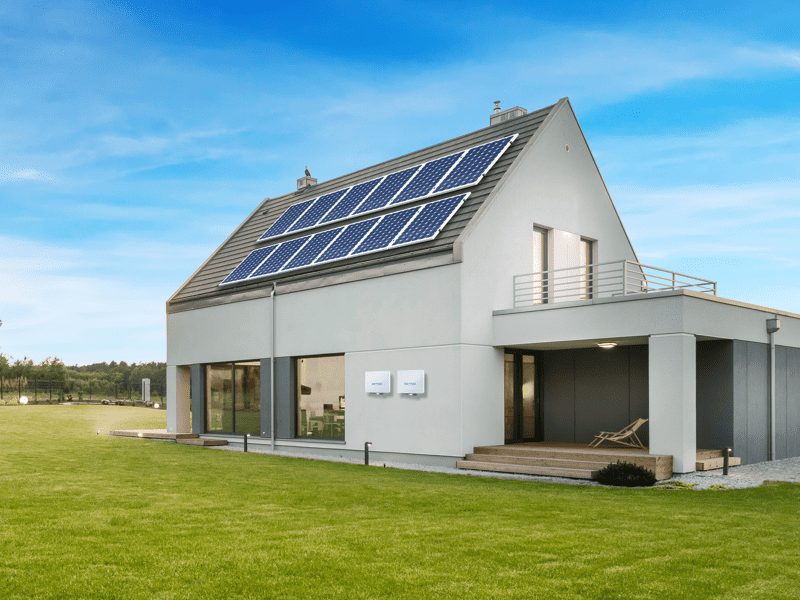In light of extreme climate risks, Delta has produced an independent, autonomous optical storage and charging system that integrates emergency backup power for families
In recent years, news about extreme climate affecting power supplies has become increasingly common. In an incident of a large-scale power outage in Texas in 2021, the gradual shutdown of power generators resulted in 4 million households having no electricity during freezing weather conditions, and electricity price skyrocketed over 200 times higher than standard rates. Following the incident, power suppliers began placing greater emphasis on updating their grid and implementing backup mechanisms, while consumers started to seek ways to establish independent, autonomous, and reliable backup power sources. To meet this need, Delta developed an optical storage and charging Bi-directional Inverter (BDI). This all-in-one solution integrates the conversion and control of AC and DC power for household electricity infrastructure, rooftop solar power, energy storage batteries, and EV charging. During regular times, it allows households to dispatch power and save on electricity costs, while in an emergency, it provides backup power so that people can live life normally.
In the past, household solar power was primarily sold back to power companies or consumed to reduce the amount of electricity purchased during peak hours. However, excess electricity could not be stored, and during extended periods of snow or rain, it could not be used to generate power. The development of household-use small power storage systems meant that households could now store electricity, but their battery capacity was mostly in the range of 5–15 kWh. Thus, while they were useful for moderating peak and off-peak electricity use, they were ineffective during lengthy power outages. In addition, adding several sets of power systems to existing power infrastructure complicates power control and management, and frequent conversions between AC and DC result in energy loss. For long-term maintenance and repair, having multiple sets of systems also makes maintenance complex and causes problems with determining who is responsible for repairs and maintenance.
From rooftop solar power to household energy storage, Delta further integrates bidirectional charging and discharging for EVs
Delta has been invested in the research and development of solar inverters for over a decade. Following consistent improvements in energy conversion efficiency, the company has now launched a household-use energy storage system that enhances the utilization rate of solar power. In 2022, they leveraged their previous successes and patented bidirectional DC–DC inversion technology to create a mixed inverter. By integrating solar power, power storage, and EV bi-directional charging and discharging, Delta has realized optical storage and charging in an all-in-one solution that helps households prepare for the imminent transition to low-carbon grids and electrified transportation.
Compared with existing methods on the market, Delta’s BDI integrates multiple sets of systems into a single device, substantially simplifying the system framework for households to set up solar power, power storage, and EV charging. The solution has a smaller footprint and simpler wiring while also being cheaper to install and easier to maintain.
High-efficiency and family-safe green energy control core
Delta’s BDI supports various energy management applications, including excess solar power storage for use at night or during periods of no sunlight. It utilizes time-of-use by storing electricity during off-peak hours for use during peak hours, while helping prevent electricity spikes that would affect existing power infrastructure when charging EVs.
Considering the need to control heat dissipation and maintain safety of the integrated system, Delta’s BDI adopts a smart heat dissipating system. It integrates natural cooling and blower cooling, adds DC–DC power density, and increases the lifespan of the fan. Its unique arc duct design is both dustproof and waterproof, which helps to meet different heat dissipation demands. Regarding certification, in addition to the interconnection and operational standard IEEE 1547-2018 for decentralized energy and power systems, Delta’s BDI also conforms to UL2202 and UL9741 standards for EV charging as well as the UL 9540 standard for energy storage safety. For after-sales service, Delta offers a web portal and mobile application that provide instant information on power generation, sales, and consumption for users to obtain from any location. These can also be used to monitor the system operation and battery status and set different operation modes.
Delta’s BDI has first been launched in the United States. Initially, it will be paired with electric trucks, utilizing the capacity of the truck batteries to create a 10-day emergency backup power supply for households. In the future, Delta will cooperate with other EV manufacturers and create a V2X bi-directional charging and discharging system that is compatible with various EV car models.
For more information on the solar inverter, please contact Delta.
More infroamtion about Renewable Energy? https://blog.deltaww.com/en/category/energyinfrastructuresolutions-en/renewables-energyinfrastructuresolutions-en/

